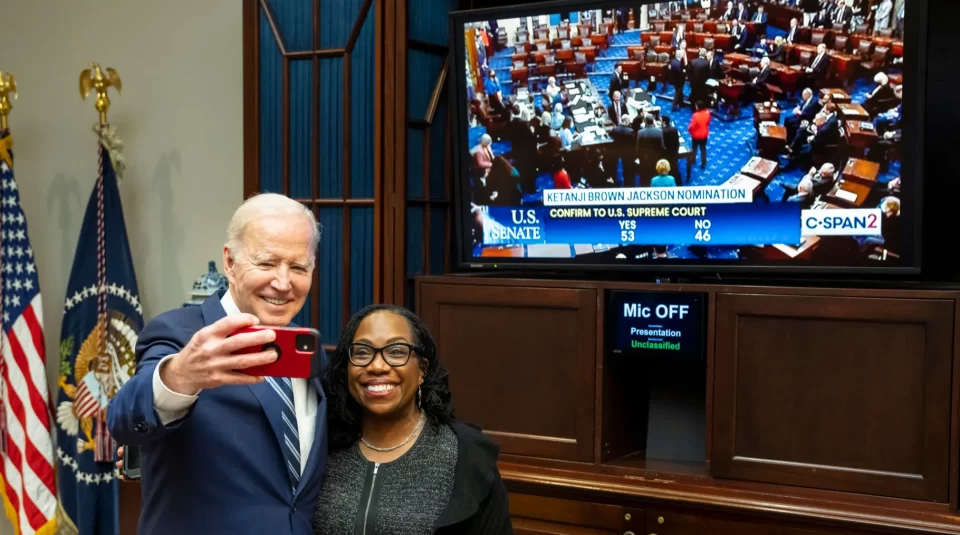Black GOP Senator Responds to Joy Reid
Democrats Capitalize With Ad Buys in Black Media
Bruce Johnson Service to Be Streamed Monday
IRE Honors Stories on EU Role in Migrant Abuse
Memphis Reporter Wins Asylum, Beats Deportation
Pa. to Pay $865,000 for Detaining Latino Drivers
Black News Channel Says It Won’t ‘Go Dark’
Leon Carter Wins Top Sports Journalism Honor
What Bob Dylan Never Said About Smokey Robinson
Local News Formats Have Made Racism Worse
. . . Black Journalists Who Left Inquirer Weigh In
. . .’Was There Racism? I Say Yes’
Passings:
William E. Cox, ‘Diverse’ Publisher
Merri Dee, Trailblazing Broadcaster
Booker Izell, Diversity Champion at AJC
Sumi Sadurni, Photojournalist
Pervis Spann, Broadcaster
Homepage photo: Judge Ketanji Brown Jackson with Presdient Biden (Credit: White House)
[btnsx id=”5768″]
Black GOP Senator Responds to Joy Reid
As African Americans and others of color rejoiced over the confirmation of Judge Ketanji Brown Jackson as the first Black woman on the Supreme Court, Tim Scott of South Carolina, the only Black GOP senator, defended his vote against her by saying that “ideology must be the determining factor — not identity — when considering such an important lifetime appointment.”
Like Ted Cruz of Texas, Josh Hawley of Missouri and all but three of the white Republicans, Scott walked out of the chamber after casting his vote against Jackson, Charles M. Blow reported Friday in his New York Times column.
In defending his “no” vote Thursday on the historic appointment, Scott cited a Tuesday tweet by MSNBC’s Joy Reid that said, “Not surprised by anything @SenatorTimScott does. He let @LindseyGrahamSC & the sheriffs dog-walk him and destroy police reform after pretending to work on it and now he’ll go along with Lindsey’s barking-dog racism against Judge Jackson because: he’s Tim Scott.”
The South Carolinian, who is campaigning for re-election this year, has become one of the Republicans’ most successful fundraisers and, according to Politico, is being mentioned as a presidential candidate for 2024.
Scott said on “Fox & Friends,” “What is so offensive about what Joy is saying is [she’s saying] that a Black man cannot think for himself, that I have to follow somebody else. That is the most ridiculous thing I’ve ever heard. But it reinforces the liberal elites’ approach to minorities who will not fall in line and do what they tell us to do. There are millions of Americans who happen to be Black, who want to think for themselves, who will think for themselves.
“But the power of the liberal elite wants to attack us like vicious dogs because they do not want anyone standing up opposed to what they are doing, leading our country in the wrong direction. It is vile, it is offensive, and we should stop allowing the liberal media to push these stories by their hosts.”
D.L. Chandler of Hip-Hop Wired reported that Scott’s name trended on Twitter and listed some of the tweets expressing disgust.
A separate tweet quoted a 1964 speech by Martin Luther King Jr. in which King said that “There are Negroes who will never fight for freedom. There are Negroes who seek profit for themselves alone from the struggle. There are even some Negroes who will go over to the other side. . . .every minority and every people has its share of opportunists, freeloaders and escapists.”
Meanwhile, critics of the media coverage of the hearings charged that commentators were reluctant to label as racist, sexist and disrespectful the treatment of Jackson by some Republican senators, while Jon Allsop of Columbia Journalism Review wrote Wednesday that “Throughout the process, major news organizations have expended a thoroughly disproportionate amount of energy on the question of whether any Republican senators might support Jackson (in the end, three will do so), even though Democratic and Republican votes count the same and Democrats don’t need the latter to get her on the court.
“There is a real debate to be had here, about the value and ongoing tenability of the idea that senators should vote for qualified Supreme Court nominees regardless of the party of the president who appoints them; this tradition has clearly slipped in recent years, and both sides have been complicit, if that’s the right word, in its erosion.
“Again, however, describing this state of affairs as something that just kinda happened or for which both sides are equally responsible is an oversimplification at best, and a distortion at worst. Our job, ultimately, should always be to cover the arguments around individual confirmation fights on their merits — and on this occasion, the most prominent right-wing arguments against Jackson have been strikingly meritless, not least the ridiculous, QAnon-adjacent smear that she is soft on pedophilia. This reflects a dangerous radicalization more than the regrettable death of a bipartisan tradition. The former is the story. The latter is mostly just hand-wringing.”

Democrats Capitalize With Ad Buys in Black Media
The Democratic National Committee Friday announced “a six-figure ad buy on Black radio stations and in Black community newspapers in battleground states across the country following Judge Ketanji Brown Jackson’s historic confirmation to the Supreme Court by a bipartisan U.S. Senate vote, as well as highlighting how President Joe Biden has been following through on his commitment to ensure our courts reflect the country they serve.
“This latest buy comes on top of another six-figure Black newspaper and radio buy placed by the DNC across the same states earlier this year.
“The radio ads will air in Michigan, Wisconsin, Pennsylvania, Florida, Arizona, and Nevada, and the print ads will appear in papers in Georgia, North Carolina, Florida, Michigan, Pennsylvania, Michigan, Wisconsin, and the District of Columbia. . . .”
Despite differences in ideology, many Black conservatives voted for Barack Obama in 2008, recognizing the historic significance of his presidential candidacy. CNN broadcast a conversation with Obama in Chicago last week. One YouTube watcher wrote, “How incredible to hear a man who thinks before he speaks and then has something intelligent to say. Thank you, President Obama.” After Obama visited the White House last week, the Washington Post’s Robin Givhan wrote, “He was a visual reference to a recent history when people believed that while the country might not have moved entirely past its racism, it had taken such an enormous step forward that surely momentum would keep society on course toward the light.”
- Perry Bacon Jr., Washington Post: Why Ketanji Brown Jackson would be such an upgrade over Breyer (March 2)
- Emily Bazelon, New York Times: What Message Did Republicans Send to Judges in Their Attack on Ketanji Brown Jackson? (March 30)
- Charles M. Blow, New York Times: Cory Booker, ‘You Had Our Back’
- Jamelle Bouie, New York Times: You May Not Find Many Friends on This Power-Hungry Supreme Court
- Jamelle Bouie, New York Times: How Are We Still Debating Interracial Marriage in 2022? (March 25)
- Gina Cherelus, New York Times: The Story Behind That Photo of Ketanji Brown Jackson and Her Daughter (March 24)
- Tommy Christopher, Mediaite: NEW POLL: Republicans Only Group to Oppose Biden’s ‘Decision To Nominate A Black Woman’ (March 26)
- Mary C. Curtis, Roll Call: But what will the ‘optics’ be? — Jackson may be cruising toward the Supreme Court, but Republicans are happy, too
- Elise Foley and Damon Dahlen, with Sarahbeth Maney, Michael McCoy, Jarrad Henderson and Cheriss May, HuffPost: ‘I Was Witnessing History’: 4 Black Photographers On What It Was Like To Cover Ketanji Brown Jackson
- Mia Gingerich and Chloe Simon, Media Matters for America: In coverage of Judge Jackson’s confirmation, mainstream media bury GOP’s racism and perpetuate misinformation (March 25)
- Robin Givhan, Washington Post: Ketanji Brown Jackson and a marathon of hope
- LZ Granderson, Los Angeles Times: Stand back, because Lindsey Graham keeps flip-flopping like crazy
- LZ Granderson, Los Angeles Times: A person learns a lot while growing locs like Judge Jackson’s (March 26)
- Linda Greenhouse, New York Times: What Kind of Story Will Ketanji Brown Jackson Tell Her Fellow Justices? (March 4)
- Jean Guerrero, Los Angeles Times: Stirring up a new ‘Satanic panic,’ the GOP wants voters to see pedophiles all around us
- Emil Guillermo, Asian American Legal Defense and Education Fund: For Ketanji Brown Jackson, the path to justice was undeniable
- Cydney Hargis, Media Matters for America: Discredited dark money group is behind the baseless claim that Biden’s SCOTUS nominee is a “left-wing dark money” puppet (Feb. 25)
- Michael Harriot, the Grio: ‘Black excellence,’ explained
- Sherrilyn A. Ifill, New York Times: Who’s Afraid of Ketanji Brown Jackson? (March 2)
- Janine Jackson, Fairness & Accuracy In Reporting: Racism ‘Hovers’ Over Events Like Jackson Hearings Because It Goes Unnamed
- Roy S. Johnson, al.com: Judge Ketanji Brown Jackson confirmation: a day to remember, celebrate and be lifted
- Janay Kingsberry, Washington Post: Jackson had to keep her cool. These Black women could relate.
- Ken Makin, Andscape: Turning Black firsts into a lasting legacy
- John McWhorter, New York Times: Ketanji Brown Jackson Has an ‘African’ Name. I Wish We Knew More About It.
- Ken Meyer, Mediaite: CNN’s Gloria Borger Trashes ‘Rude’ Republicans Snubbing Ketanji Brown Jackson After Confirmation Vote: ‘This is a Moment in History!’
- Zeke Miller and Will Weissert, Associated Press: Cheers for Jackson, who declares, ‘We’ve made it, all of us’
- Sophia A. Nelson, the Grio: Republicans are no longer a serious party
- Clarence Page, Chicago Tribune: Little room for rationality in attacks on Ketanji Brown Jackson’s record (March 29)
- Len Patel, AsAmNews: Asian Americans give thumbs up to confirmation of Katanji Brown Jackson to Supreme Court
- Reporters Committee for Freedom of the Press: Reporters Committee reviews Judge Ketanji Brown Jackson’s record on First Amendment, Freedom of Information Act cases (March 21)
- Kate Riga, Talking Points Memo: All Four Republicans Who Hectored Jackson On Sex Offenders Rewarded With Fox News Airtime (March 24)
- Eugene Robinson, Washington Post: The eloquent moment that cut through the GOP’s ugliness in the Jackson hearings (March 24)
- Dan Shelley, Radio Television Digital News Association: ‘Jackassery’: The latest demagoguery about cameras in the Supreme Court (March 30)
- Kimberly Atkins Stohr, Boston Globe: The gift that will benefit Jackson, and the nation, after her confirmation: Time
- Helen Ubiñas, Philadelphia Inquirer: The disrespect Ketanji Brown Jackson faced was intentional — and all too common (March 25)
- Maya Yang, the Guardian: Judge Jackson stands on the shoulders of giants’: women of color on a day to celebrate
- Emily Yokley, Morning Consult: Black Voter Enthusiasm for the Midterms Surges After Ketanji Brown Jackson Nomination (March 9)
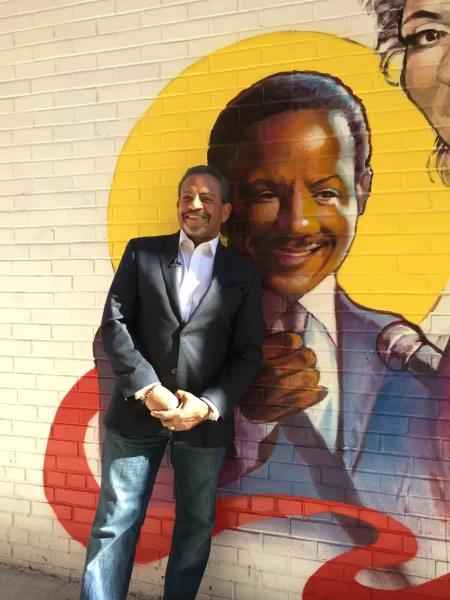
Bruce Johnson Service to Be Streamed Monday
“We continue to celebrate and honor the memory of beloved WUSA9 journalist Bruce Johnson, who died on April 3 after a heart attack,” Washington’s WUSA-TV declared Friday.
“His family has established a tribute page to celebrate their beloved husband, father, friend, mentor and author and the website provides ways to honor the memory of the man who loved to give and help others himself.
“On www.c.BruceJohnson.org visitors can contribute to two organizations that were important to him — the Lymphoma Research Foundation and The American Heart Association.
“The tribute page also provides a portal where viewers will be able to watch Monday’s celebration of life service for Bruce, starting at 11 a.m.
“During the service, please share your memories of Bruce on Twitter by using the hashtag #CBJmemorial and tagging the accompanying memorial Twitter page @CBJ_memorial. . . .”
- Jacob Fenston, DCist: Legendary Local News Anchor Bruce Johnson Dies At Age 71
- Hamil R. Harris and D. Kevin McNeir, Washington Informer: Veteran News Anchor Bruce Johnson Suffers Fatal Heart Attack
- John Kiesewetter, WVXU-TV, Cincinnati: Bruce Johnson, one of Cincinnati’s first Black TV journalists, dies at 71
- National Press Club: Statement on Bruce Johnson
- Kayla Sharpe, Axios: Remembering Bruce Johnson
- WUSA-TV, Washington: How Bruce Johnson maintained 40-year friendship with woman he met as an infant burned in fire (video)
IRE Honors Stories on EU Role in Migrant Abuse
“We investigated the anonymous, unpunished death of a young African migrant in one of Libya’s most notorious jails for those captured trying to make their way to Europe,” begins a description of one of the winners in the annual awards of Investigative Reporters & Editors.
IRE’s Tom Renner Award honors coverage of organized crime or other criminal acts.
 “Through that death — Aliou Candé (pictured) was a 28-year-old father of three from Guinea-Bissau — we laid bare how the European Union supports, financially and politically, a brutal, outsourced policy of immigration enforcement. Libya has been hired by Europe to do the dirty work of keeping people in Africa. The human costs have been extraordinary, and the United Nations in October put it most plainly, calling the work of Libya’s Coast Guard and its detention of migrants ‘crimes against humanity.’ And the U.N. made clear Europe was a party to the atrocities.”
“Through that death — Aliou Candé (pictured) was a 28-year-old father of three from Guinea-Bissau — we laid bare how the European Union supports, financially and politically, a brutal, outsourced policy of immigration enforcement. Libya has been hired by Europe to do the dirty work of keeping people in Africa. The human costs have been extraordinary, and the United Nations in October put it most plainly, calling the work of Libya’s Coast Guard and its detention of migrants ‘crimes against humanity.’ And the U.N. made clear Europe was a party to the atrocities.”
The story, “The Secretive Prisons That Keep Migrants Out of Europe,” was published in the New Yorker late last year in collaboration with the Outlaw Ocean Project, which describes itself as “a non-profit journalism organization based in Washington D.C. that produces investigative stories about human rights, environment and labor concerns on the two thirds of the planet covered by water.”
During their reporting, according to judges of the George Polk Awards — which in February also honored the investigation — project director Ian Urbina “and his team were seized by Libyan agents and held for six days at a black site where they were blindfolded, beaten and interrogated before being released.”
Asked what had changed since the article was published, the Outlaw Ocean Project directed Journal-isms to a follow-up in February. “After our investigation was published, there was a flurry of international attention on the state of migrant detention in Libya. On January 13th, the Libyan authorities ordered the closing of Al Mabani — a development we found out only several weeks later, through the U.N.H.C.R. [United Nations High Commissioner for Refugees].
“The move to shutter Libya’s most notorious migrant prison might be taken as progress. However, it is also an indication of the lack of accountability in the ways that migrants are handled in Libya. Detention centers are opened, closed, and reopened from one week to the next, and the migrants are shuttled between them. . . .”
Information on the investigation was published by 71 news outlets in 33 countries in 12 languages, according to the Outlaw Ocean Project website.
The IRE Awards, announced last week, honored iInvestigations that “revealed the story of Florida employees poisoned while trying to earn a paycheck, uncovered the deaths of those working in scorching heat across the country and scrutinized the role of race and inequality in society,” the organization said. The winners are listed here.

Memphis Reporter Wins Asylum, Beats Deportation
“Manuel Duran, the Memphis Spanish-language reporter whose arrest at a 2018 immigration protest led to more than 465 days behind bars and sparked international attention, lawsuits and protests in Memphis, has won his political asylum case,” Micaela A Watts and Daniel Connolly reported March 24 for the Commerical Appeal in Memphis.
“For years, Duran had faced the threat of deportation to his native El Salvador and had argued that if he were deported, he could be killed.
“Duran had been free on bond since 2019 and continued to work for his online news outlet, Memphis Noticias. The Wednesday decision by a Memphis Immigration Court judge now means Duran has a clear path toward long-term legal status in the United States.
” ‘I feel happy,’ Duran, 46, said in a Spanish-language interview Thursday. ‘It’s a great victory and what can I tell you — I’m grateful for the work of the team of lawyers that represented me.’ “
Duran’s legal team included “attorneys from the Southern Poverty Law Center and Advocates for Immigration Rights; the number of attorneys combined with widespread support of Duran gave the Memphis Noticias reporter a distinct advantage, his attorneys said. . . .”
The National Association of Hispanic Journalists was among those supporting Duran after his arrest.

Pa. to Pay $865,000 for Detaining Latino Drivers
“The state of Pennsylvania has agreed to pay $865,000 to settle a federal lawsuit alleging that its state troopers routinely and unconstitutionally pulled over Latino drivers, demanded their ‘papers’ and held them and their passengers for pickup by federal immigration authorities — a practice that escalated markedly after President Donald Trump took office in 2017,” Dale Russakoff and Deborah Sontag reported Friday for ProPublica and the Philadelphia Inquirer.
“The complaint, filed by the Pennsylvania ACLU and drawing in part on a 2018 series of ProPublica articles published in collaboration with The Inquirer, detailed cases of state troopers stopping and then detaining immigrants under the auspices of federal immigration laws, which it alleged they had no authority to enforce. The immigrants were engaged in ordinary, legal activities, according to the complaint: traveling to see family members, driving to or from work, buying a soda in a state police barracks, awaiting medical help following a traffic accident or, in one case, returning from a job interview accompanied by a wife who was nine months pregnant. . . .”
Black News Channel Says It Won’t ‘Go Dark’
In this report Friday, Joe Ripley at WXIA-TV in Atlanta explains why Black News Channel employees are still owed money. On Wednesday, Scott Jones published the network’s Chapter 11 filing from protection from bankruptcy, in which the channel listed its creditors and said it continued to look for investors. Since 2018, an investment company affiliated with Shahid Khan, owner of the Jacksonville Jaguars NFL team, had invested more than $76 million in the venture, the filing said.
The network “remains on the air and continues to make its pre-existing library of engaging and relevant content available to its network partners. So long as the Debtor has the resources to operate at the present level or above, the Debtor has no intention to complete[ly] discontinue operations (i.e. go dark.)” (Credit: YouTube)
- Juwan Holmes, Mediaite: What Happened at the Black News Channel? How Toxic Content, Lawsuits, and Low Ratings Led to a Promising Network’s Collapse (March 26)
- Robbie R. Morganfield, Diverse: Issues in Higher Education: The Black News Channel Died Suddenly: We Should be Ashamed (March 29)
Leon Carter Wins Top Sports Journalism Honor
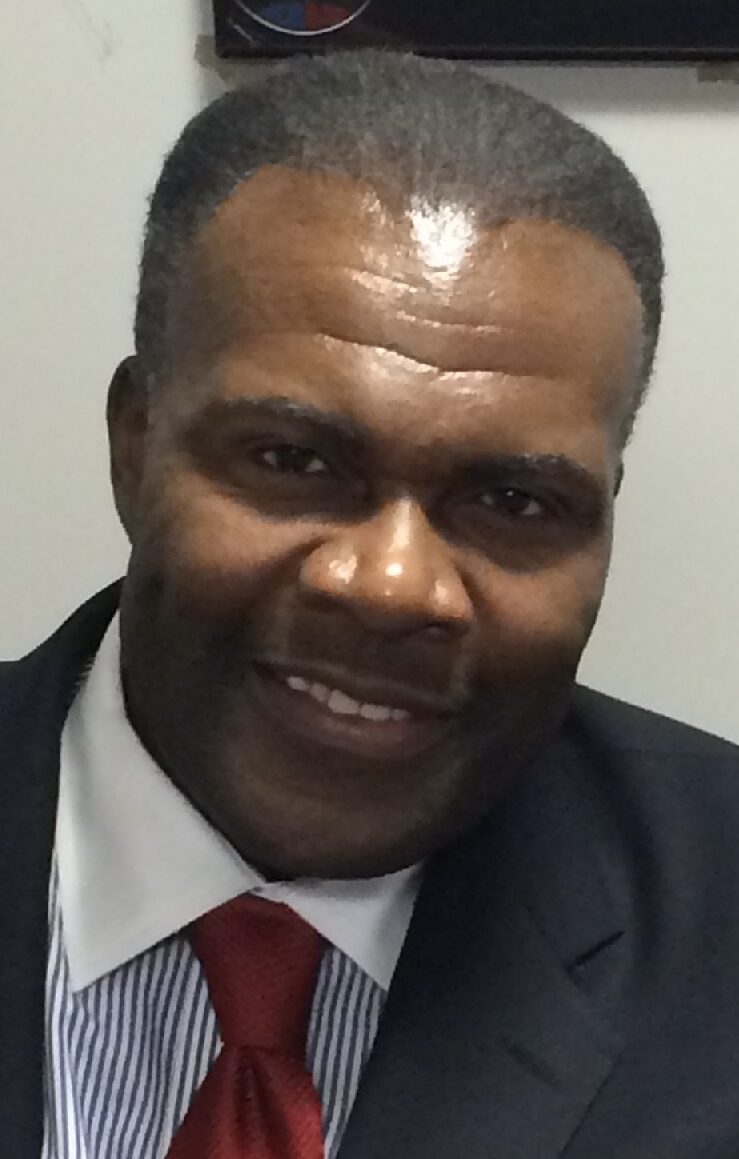 Leon Carter (pictured), a founder of the Sports Journalism Institute, was voted the Red Smith Award from Associated Press Sports Editors, the organization announced Friday, adding that “the award is regarded as the highest sports journalism honor in the country.”
Leon Carter (pictured), a founder of the Sports Journalism Institute, was voted the Red Smith Award from Associated Press Sports Editors, the organization announced Friday, adding that “the award is regarded as the highest sports journalism honor in the country.”
Carter is only the third Black person to win it, after pioneers Sam Lacy and Wendell Smith.
APSE continued, “Carter is the editorial director for talent and development at The Athletic. The veteran journalist has also worked for the Louisville Courier-Journal and Newsday, was sports editor at the New York Daily News and a vice president at ESPN.”
The Sports Journalism Institute is a nine-week training and internship program for college students interested in sports journalism careers. Some 300 SJI Alumni are working in print, digital and television across the country, according to its website.
Carter said, “When I think about 30 years of SJI, I think about these words from Jackie Robinson: ‘A life is not important except in the impact it has on other lives.’ SJI has had a tremendous impact.”
- Gregory Lee Jr., Editor & Publisher: Building better newsrooms: News publishers need more consistent momentum toward DEI goals
What Bob Dylan Never Said About Smokey Robinson
 Al Abrams, described as the white son of a Jewish family, “came to be the very first employee of Motown Records, engaged by Berry Gordy as his PR man after an epic feat of radio plugging!,” in the words of the BBC.
Al Abrams, described as the white son of a Jewish family, “came to be the very first employee of Motown Records, engaged by Berry Gordy as his PR man after an epic feat of radio plugging!,” in the words of the BBC.
As a public relations man, Abrams hit a home run. Abrams messaged Journal-isms in 2009, “I created some legends that I made up on the spur of the moment. Smokey Robinson — the Bob Dylan quote about him being America’s greatest living poet — I made that up. Now, it’s been around so much that if you asked Dylan, he’d probably say he said it. I came up with wild stuff.”
When Abrams died in 2015, Rolling Stone reported that “In 1965, Abrams spread word that Bob Dylan had championed Motown’s Smokey Robinson as ‘America’s greatest living poet.’ Abrams later admitted he and Dylan friend Al Aronowitz concocted that quote.”
Nearly 60 years later, the quote survives as “fact.” The National Newspaper Publishers Association, an organization of Black-press publishers, used it again on March 23. “Once identified by Bob Dylan as America’s ‘greatest living poet,’ Robinson, a Rock’ n’ Roll Hall of Fame and Songwriters’ Hall of Fame inductee, still stuck to his guns . . .” wrote Stacy M. Brown.
The story was about Robinson’s argument against the term “African American.” The argument, too, is based on misinformation, as this column reported in January (scroll down). (Illustration by Joe Young).

Local News Formats Have Made Racism Worse
The “Eyewitness News” and “Action News” local broadcast formats have “worked to deepen racial tensions and reinforce racial stereotypes about communities of color,” Layla A. Jones reported March 29 as part of the Philadelphia Inquirer’s “A More Perfect Union” series “examining the roots of systemic racism through institutions founded in Philadelphia.”
“This format launched in Philadelphia, first with the birth of Eyewitness News in 1965, and then with Action News in 1970. Over the next few generations, the pervasive and seductive twin broadcasts would spread to stations across the country — and with them, negative narratives about neighborhoods that would effectively ‘other’ certain groups based largely on race, class, and zip code.
“More than half a century later, the impact of this efficient and pioneering approach remains, but continues to be condemned as harmful, as critics call for a reimagining of stories that tell a fuller story of communities, one that more accurately captures the humanity and dignity of all who live there. . . .”
In her 6,000-word examination, Jones also wrote, “As local TV news ratings rose and ad earnings rolled in through the end of the 20th century, Philadelphia lost hundreds of thousands of white residents to the suburban locales seen in newscast commercials for four-door sedans, Ethan Allen bedroom sets, and real estate brokerages. Images of white families in tidy subdivisions and spacious homes broke up dispatches that more often than not cast the city and its Black residents in a negative light.
“Network executives had figured out how to extract news that entertained and attracted viewers with a familiar story line: An endless loop with scenes of dangerous urban streets. . . .”

. . . Black Journalists Who Left Inquirer Weigh In
Harold Jackson (pictured), former Philadelphia Inquirer editorial page editor, responded to the Inquirer’s “More Perfect Union” series on March 21 under the headline “When it comes to race, The Inquirer may be trying to improve. But it needs to try harder.”
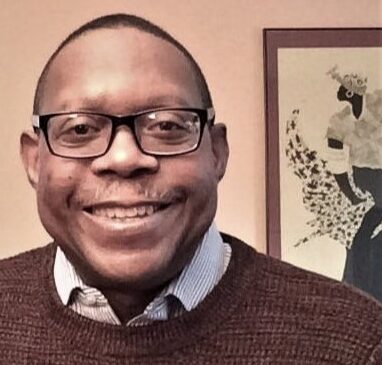 “I owe a debt of gratitude to the paper for making me its first Black editorial page editor in 2007,” Jackson wrote. “In 2017, my department was reorganized, and when a managing editor of opinion position was created, I did not get the job.
“I owe a debt of gratitude to the paper for making me its first Black editorial page editor in 2007,” Jackson wrote. “In 2017, my department was reorganized, and when a managing editor of opinion position was created, I did not get the job.
“Instead of keeping my office, I was given a desk in the newsroom. That was a first for an Inquirer editorial page editor. Was my treatment racist? Given similarly demeaning treatment received by other Black editors and reporters who confided in me during my 20 years at the Inquirer, I would have to say yes.
“I am proud of the paper for acknowledging its past bias in ‘Black City, White Paper,’ written by Wesley Lowery, and a subsequent apology by Inquirer publisher Elizabeth H. Hughes.
“Now it’s time for those appropriate steps to be followed by corrective acts. The Inquirer should hire and promote enough Black people and other people of color to make a more discernible difference in how Philadelphia is covered.”
. . . ‘Was There Racism? I Say Yes’
On March 15, former Inquirer reporter Vernon Clark (pictured) wrote, “The Inquirer’s self-examination only scratched the surface of its mistreatment of Black staffers.”
 “Some question whether there was racism in The Inquirer newsroom. To them I say: yes. Keep in mind that all racism is not overt, and in some cases, there is willful blindness.
“Some question whether there was racism in The Inquirer newsroom. To them I say: yes. Keep in mind that all racism is not overt, and in some cases, there is willful blindness.
“Consider how some senior Black staff writers fared after the arrival of new ownership in the late 2000s.
“A senior Black sportswriter, who achieved national acclaim while covering the Sixers, was drummed out of the paper in 2010. This former columnist, now one of the country’s top sports analysts, spent 15 years at The Inquirer, eventually becoming the company’s highest-paid editorial employee. Management tried to fire him. The union, to its credit, fought long, hard, and successfully on the man’s behalf. Eventually, however, he left.
“In 2009, a Black reporter, who had covered Philadelphia and especially New Jersey since 1976, decided to resign in the midst of what he described to me and others as harassment and a punitive reassignment.
“In 2015, I decided to call it quits after 29 years at The Inquirer. A year or two before my departure, a top editor summoned me to his office to tell me that I was being reassigned from covering North and Northwest neighborhoods to writing obituaries, an assignment that is often considered a demotion for a journalist with my seniority. At the time, I was the only Black or brown person on the city desk.
“I wrote obituaries begrudgingly for a while. After I got my lawyer involved, the bosses decided that I should be a general assignment reporter. My supervisor at that time, in my first-ever performance review since my arrival at the paper in 1986, indicated that as a reporter I was slow and that I did not write enough articles. I was then ordered to write a story a day.
“To those who attack Lowery’s independent reporting on ‘Black City, White Paper,’ and who say they did not see racial bias in The Inquirer newsroom, I say, take a closer look, examine the numbers, look at how journalists are assigned to beats. Reach out to people in underserved communities. Ask them when was the last time an Inquirer reporter was in their neighborhood. . . .”
- NewsGuild of Greater Philadelphia: Guild Files Another Discrimination Grievance (March 17)
- Larry Platt, Philadelphia Citizen: Is The Inquirer Too Woke? (March 30)
Passings
William E. Cox, ‘Diverse’ Publisher
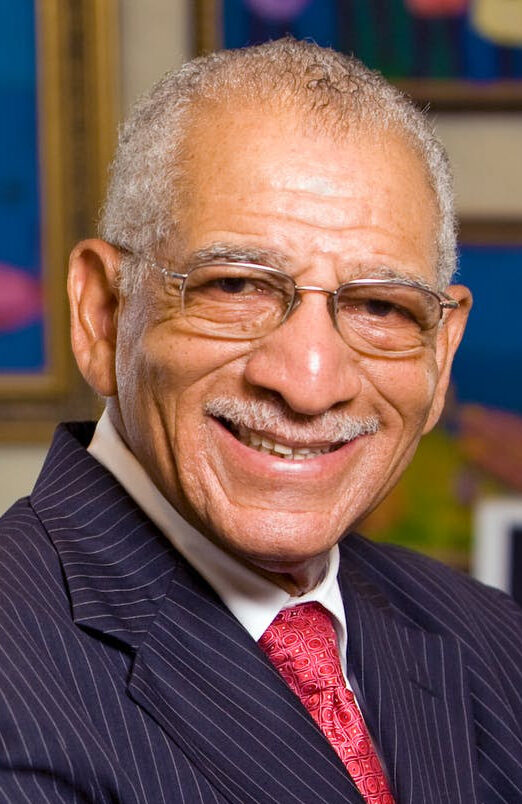 “Dr. William E. Cox (pictured) — a veteran educator and business leader — who co-founded Cox, Matthews and Associates (CMA) the publisher of Diverse: Issues In Higher Education, died early this week, after a lengthy illness,” Jamal Watson wrote for the publication March 23. “He was 79.”
“Dr. William E. Cox (pictured) — a veteran educator and business leader — who co-founded Cox, Matthews and Associates (CMA) the publisher of Diverse: Issues In Higher Education, died early this week, after a lengthy illness,” Jamal Watson wrote for the publication March 23. “He was 79.”
Watson also wrote, “It was through his wife’s affiliation with the local branch of the NAACP in Fairfax, Virginia, that Cox ultimately met his business partner of nearly forty years — Frank L. Matthews.
“The two southerners were deeply passionate about education and set out on a course to transform the higher education landscape by training a focus on Blacks. In 1984, Black Issues In Higher Education was born and quickly became a must-read publication for graduate students and Black faculty and staff looking to navigate academe. In 2005, the publication broadened its focus and changed its name to Diverse: Issues In Higher Education. . . .”
“He founded Black Issues Book Review and helped to put Black authors on the radar by pushing these writers to self-publish their work. . . .”
“What it did for the black literary world was as profound as what he did for higher education,” Angela Dodson, a contributor to the book review from its beginning in 1999 and executive editor from 2003 to 2007, told Journal-isms.
Merri Dee, Trailblazing Broadcaster
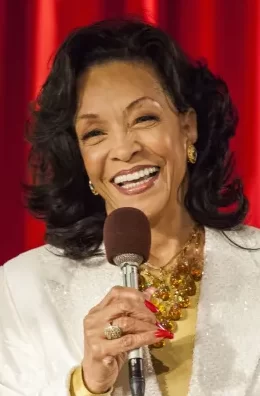 “Merri Dee (pictured), a fixture on Chicago TV screens for decades as a reporter and anchor for WGN-TV, has died at 85, ending a life of philanthropy, advocacy and survival as compelling as any of the stories she covered on television,” Mitchell Armentrout and Katie Anthony reported March 16 for the Chicago Sun-Times.
“Merri Dee (pictured), a fixture on Chicago TV screens for decades as a reporter and anchor for WGN-TV, has died at 85, ending a life of philanthropy, advocacy and survival as compelling as any of the stories she covered on television,” Mitchell Armentrout and Katie Anthony reported March 16 for the Chicago Sun-Times.
“Ms. Dee was a trailblazing broadcaster who won the hearts of Chicagoans while hosting public affairs shows, charity telethons and lottery drawings over a 43-year tenure at WGN. . . .”
“As a young girl growing up on the West Side of Chicago, Merri Dee was one of my TV role models,” Dorothy Tucker, president of the National Association of Black Journalists, said in an NABJ tribute. “Imagine my thrill when I attended Northwestern and lived down the hall from her daughter, Toya. The girls in the dorm always looked forward to Ms. Dee’s visits. She was full of energy, had a big beautiful smile, and dressed like a couture fashion model. Over the years, I remained awestruck by how she made everything she did look easy.”
A celebration of life is planned from 11 a.m. to 1 p.m. May 3 at Christ Universal Temple, 11901 S. Ashland Ave., Chicago, the Sun-Times said.
Booker Izell, Diversity Champion at AJC
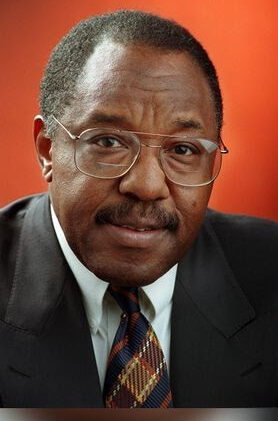 “Booker Izell (pictured) was not a journalist, but embodied those qualities,” Mark Woolsey reported Feb. 28 for the Atlanta Journal-Constitution.
“Booker Izell (pictured) was not a journalist, but embodied those qualities,” Mark Woolsey reported Feb. 28 for the Atlanta Journal-Constitution.
Izell, 82, died Feb. 16 after an extended illness.
“The Ohio native changed the face of The Atlanta Journal-Constitution and its parent company Cox Enterprises by championing diversity, attracting more employees of color and mentoring a generation of Black journalists.
“As head of diversity and inclusion, he guided those changes with a combination of affability, compassion, ability to communicate and directness — when necessary.
“ ‘Booker was no pushover,’ said retired senior managing editor of the AJC James Mallory. ‘And he had a way about him of getting his point across. ‘ ”
Sumi Sadurni, Photojournalist
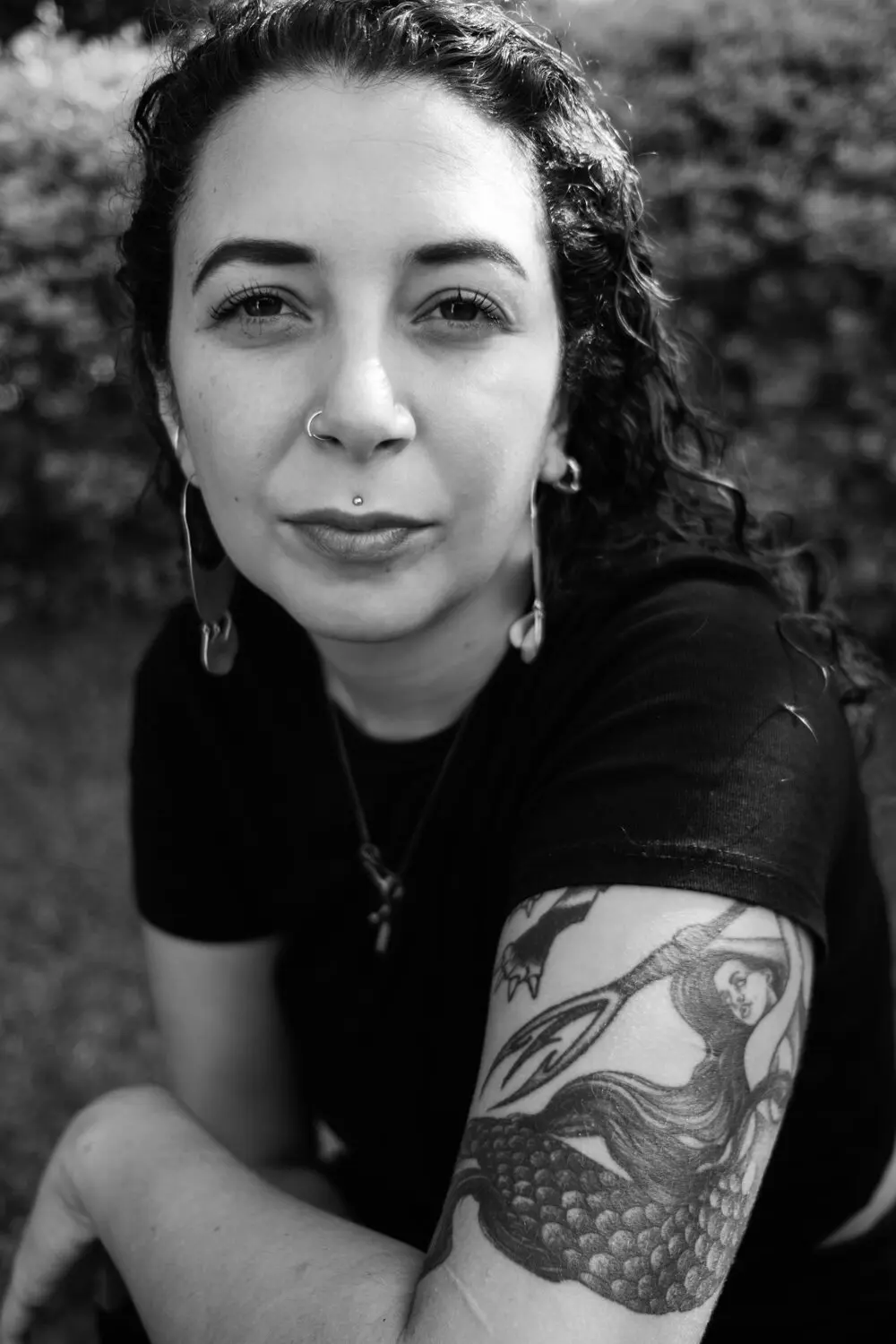 “Sumy Sadurni (pictured), a prolific photojournalist who documented human rights struggles, political resistance and gender issues in East Africa through a piercing and intimate lens, died on March 7 in Kampala, Uganda,” Annabelle Williams reported March 21 for The New York Times. “She was 32.
“Sumy Sadurni (pictured), a prolific photojournalist who documented human rights struggles, political resistance and gender issues in East Africa through a piercing and intimate lens, died on March 7 in Kampala, Uganda,” Annabelle Williams reported March 21 for The New York Times. “She was 32.
“Her brother, Jorge Sadurni Carrasco, said she died in a car accident.
“Ms. Sadurni, a freelancer, traveled the world, but she was best known for her work in her adopted country, Uganda. Her photographs for Agence France-Presse appeared in some of the world’s leading newspapers, including The New York Times. . . .” (Photo: Chris Dennis Rosenberg)
Pervis Spann, Broadcaster
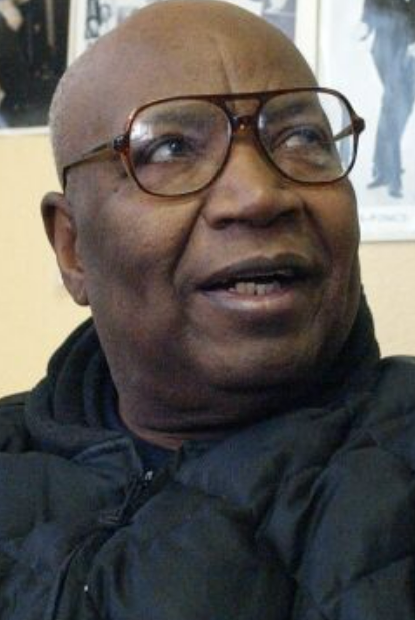 “Pervis Spann (pictured), who helped boost the careers of many radio personalities, disc jockeys and successful recording artists as he transformed WVON into the ‘Voice of the Negro’ and later, the ‘Voice of the Nation,’ died Monday, March 14,” Erick Johnson reported March 17 for the Chicago Crusader. “He was 89.
“Pervis Spann (pictured), who helped boost the careers of many radio personalities, disc jockeys and successful recording artists as he transformed WVON into the ‘Voice of the Negro’ and later, the ‘Voice of the Nation,’ died Monday, March 14,” Erick Johnson reported March 17 for the Chicago Crusader. “He was 89.
“On its Facebook page, WVON said Spann died after a lengthy battle with Alzheimer’s disease.
“WVON radio host Perri Small, during her morning show, announced Spann’s death and made note of his immense contributions as co-founder of the station’s parent company, Midway Broadcasting Corporation, where Spann served as President Emeritus until his death. . . .”
- Cheyanne M. Daniels, Chicago Sun-Times: Jesse Jackson, Al Sharpton among mourners honoring legendary DJ Pervis Spann, ‘The Blues Man’ (March 23)
- National Association of Black Journalists: NABJ Mourns the Loss of Broadcasting Legend Pervis Spann (March 16)
‘[btnsx id=”5768″]
To subscribe at no cost, please send an email to journal-isms+subscribe@groups.io and say who you are.
Facebook users: “Like” “Richard Prince’s Journal-isms” on Facebook.
Follow Richard Prince on Twitter @princeeditor
Richard Prince’s Journal-isms originates from Washington. It began in print before most of us knew what the internet was, and it would like to be referred to as a “column.” Any views expressed in the column are those of the person or organization quoted and not those of any other entity. Send tips, comments and concerns to Richard Prince at journal-isms+owner@
View previous columns (after Feb. 13, 2016).
View previous columns (before Feb. 13, 2016)
- Diversity’s Greatest Hits, 2018 (Jan. 4, 2019)
- Book Notes: Is Taking a Knee Really All That? (Dec. 20, 2018)
- Book Notes: Challenging ’45’ and Proudly Telling the Story (Dec. 18, 2018)
- Book Notes: Get Down With the Legends! (Dec. 11, 2018)
- Journalist Richard Prince w/Joe Madison (Sirius XM, April 18, 2018) (podcast)
- Richard Prince (journalist) (Wikipedia entry)
- February 2018 Podcast: Richard “Dick” Prince on the need for newsroom diversity (Gabriel Greschler, Student Press Law Center, Feb. 26, 2018)
- Diversity’s Greatest Hits, 2017 — Where Will They Take Us in the Year Ahead?
- Book Notes: Best Sellers, Uncovered Treasures, Overlooked History (Dec. 19, 2017)
- An advocate for diversity in the media is still pressing for representation, (Courtland Milloy, Washington Post, Nov. 28, 2017)
- Morgan Global Journalism Review: Journal-isms Journeys On (Aug. 31, 2017)
- Diversity’s Greatest Hits, 2016
- Book Notes: 16 Writers Dish About ‘Chelle,’ the First Lady
- Book Notes: From Coretta to Barack, and in Search of the Godfather
- Journal-isms’ Richard Prince Wants Your Ideas (FishbowlDC, Feb. 26, 2016)
- “JOURNAL-ISMS” IS LATEST TO BEAR BRUNT OF INDUSTRY’S ECONOMIC WOES (Feb. 19, 2016)
- Richard Prince with Charlayne Hunter-Gault, “PBS NewsHour,” “What stagnant diversity means for America’s newsrooms” (Dec. 15, 2015)
- Book Notes: Journalists Follow Their Passions
- Book Notes: Journalists Who Rocked Their World
- Book Notes: Hands Up! Read This!
- Book Notes: New Cosby Bio Looks Like a Best-Seller
- Journo-diversity advocate turns attention to Ezra Klein project (Erik Wemple, Washington Post, March 5, 2014)
When you shop @AmazonSmile, Amazon will make a donation to Journal-Isms Inc. https://t.co/OFkE3Gu0eK
— Richard Prince (@princeeditor) March 16, 2018
![]()

